A while ago, CG featured an article stating that ‘Games Journalism is Broken’. Meanwhile, a heavy debate has arisen among game journalists about the state of games journalism.
In this first part of the “Idealism in the Industry” series we talk to Dr. David Nieborg, game journalist, researcher and teacher at the University of Amsterdam. He talks to us about the ‘problem’ of games journalism, the ‘games journalism lifestyle’ and his idealisic vision on what games journalism should be.
‘The problem’ of games journalism
David Nieborg: “First of all, the whole notion of there being something as games journalism is controversial. A significant part of those who report on games and game culture don’t think of themselves as journalists, but as fans, critics or bloggers. [...] Ideally, journalism should be understandable, interesting, relevant and critical. And above all: journalists should only have to justify themselves to their readers. […] At the moment, there are very few professional, independent, traditional journalists writing about games. And in my eyes this also means that there are few good examples to follow.
Second of all, what characterizes games journalism in its current form is that it takes a very specific, unique position in respect to both the audience and the games industry. Readers seem to prefer short, subjective analysis above critical essays about games. The games industry in turn has an iron grip over the provision of news about (new) games and is thusly capable of initiating, steering and sometimes even preventing news reporting.
Several gamers and members of the games press seem to have the idea that what is good for the games industry is good for gamers. But this isn’t (always) the case. It’s the job of the games press to follow the industry with a critical eye.”
All about games
Nieborg raises a good point here. It is often forgotten that games journalism is still a form of traditional journalism and that we should always have a critical eye, instead of just bluntly stating what we see. Games journalism is currently in a trend where articles aren’t necessarily understandable, interesting, relevant and critical, but they are mostly entertaining and appeal to the masses.
If you’re a game journalist, think about this: did you have an idol? A journalist or a magazine crew that you adored and wanted to be like? I was a big fan of a certain Dutch game magazine since I was 11. I wanted to meet the writers, do what they do, write awesome articles in that wonderful magazine. Until I grew up and started asking myself: How many times can you put the word ‘boob’ in a serious journalistic publication? The more I started writing, the more websites and magazines I wrote for, the more I realized that a lot of influential media outlets are really not what I thought they were. Of course, jokes about boobs are funny at times, but the moment that cursing, talking about wild parties and ‘that hot chick that bends over in game X’, I don’t think it’s good journalism anymore. You shouldn’t just be out to please the crowd, you should entice them, make them passionate about what you write, excite them with something more.
But at times this can be problematic, since a lot of journalists lack knowledge. We should (want to) know and do research about the history of games, about games that laid the groundwork for other games that we have come to love. We should know about past and present cultural issues that are tied with games. Every game journalist should know not just who Miyamoto and Molyneaux are, but also who Don Daglow, Louis Castle and Gary Gygax are (– If you are a game journalist and you don’t know who Gary Gygax is; shame on you).
David Nieborg: “Think about the limited freedom that console gamers have. Contrary to PC gamers, console gamers don’t have a lot of freedom when it comes to adapting their games. Not so long ago it was very common to, especially with shooters, change everything that was possible (“modding”). New maps, avatars or entire storylines could be adapted by amateur developers. This mod-culture has been professionally stifled by the platform owners (Microsoft, Nintendo and Sony as well). Besides some exceptions (like LittleBigPlanet, Unreal Tournament 3 or Guitar Hero: World Tour), it isn’t possible to change or make additions to existing games. Amongst game journalists there is , [maybe] simply a lack of historic knowledge about a time where there were more freedoms.
In the end it is always a conscious assessment for developers and publishers to allow or implement, or not, something in a game or game console. Some things cost a lot of money or are tricky to do. But it is the task of game journalists to question the conscious removal or prohibition of for example the possibiliy to mod.”
Why change?
But why change something that seems to be running smoothly? Among game journalists, opinions are very divided. One half is looking to put more in their writings, and the other half thinks that what we have right now is just fine. They fear that we (the idealists) want to turn everything around, get rid of the old model and do something completely different. This, however, is not the case. Reviews, short articles and announcements are a big part of games journalism and they are indeed interesting pieces of information. We know that, and we do not want to get rid of them. I enjoy a nice review every once in a while, and I jump up excitedly when Sony or Capcom ancounce yet another sequel to one of my favourite games. But there is so much that we are not doing that could greatly expand the scope and range of games journalism.
David Nieborg: “In my opinion the current form of games journalist doesn’t ‘work’, I think that the medium (games) has a huge potential but that games journalism (but also consumers and the industry) is partly mis-recognising that potential. Making an effort for independent games journalism should mean that a (more) critical culture comes from gamers. Critical means nothing more or less than wondering why certain choices have been made by certain parties, and what the consequences of those choices have been. So that doesn’t necessarily mean that it should be from a negative perspective. In the long term it would be a good thing to look at the possibilities of the medium and not just at the next title in the franchise or new hardware.”
CG: Now, how can we arouse the interest for in-depth articles? What can game journalists do to broaden the topics covered in games journalism?
David Nieborg: “By writing good, readable, critical pieces with meaningful content. Nothing more, but nothing less. This doesn’t mean we should have long(er) or (more) intellectual pieces. It means we should ask questions that nobody asks, try to look a little bit further and don’t lose track of (game) history. Good articles, short ones, and well argued pieces as well, take a lot more time and imagination than a ‘simple’ review or a report of a press event.”
But [...] a large group of game journalists don’t have a direct reason, or better yet an interest, in breaking with the (current) status-quo. When you have a job as a game journalist, and certainly a paid one, why should you want to innovate and think about the long term implications of your actions? Next to that, the games industry has even less interest in changing games journalism. At this moment there are many game websites, programs and magazines that are very effective in directly spreading the marketing material of the industry (think press releases, screenshots and announcements). Why would the industry want to re-educate an apparatus that would then make their jobs hard(er)?”
CG: Is it objectivity that we are looking for in games journalism?
David Nieborg: “Objectivity in journalism remains a pitfall. A journalist always makes choices that support or contradicts a certain idea or theory. What I think is more important is a critical attitude, independence and transparency. An objective game review doesn’t exist. But you can make sure that you look at the game with open eyes and try not to be influenced by others that have an interest with another opinion. If you use a quote from a press release or an employee from a marketing agency, be open about that. A lot of game journalists hide, mostly not consciously, that the information they pass on is directly coming from third parties. Whether that be colleague journalists, gamers, or employees from the games industry.”
CG: In what way does the ‘game journalist lifestyle’ influence articles? We’re talking goodies, parties with free drinks, food and elaborate shows?
David Nieborg: “There is indeed something you could call the ‘game journalist lifestyle’. I have tasted this lifestyle for two years and it does take strength and consciousness about your own position as a journalist if you don’t want to be influenced by this. Whatever you say, it remains bribery, no matter how indirect. One good turn deserves another. Free drinks are rare and free trips to five-star hotels have a price.
It’s a part of the industry and it isn’t unique (think about similar practices within car, fashion and movie journalism). But if this is the only way to get news, if this is the only reason to do what you do as a journalist, that would be a shame. In an ideal world, journalists would have direct access to developers and wouldn’t have to get their information at press events or through press agencies. For full disclosure, I have also been on press trips and been given (free) booze. But if I had to pick between a good, interesting interview that leads to news (or a good story), or a meaningless press trip (read: a drunken party with Dutch colleagues), I would have to go with the first.
[But] the parties have a function, namely networking and sharing information in an informal way. There’s nothing wrong with that, in its essence. But you have to constantly be aware of your position as a journalist. The moment that parties become a weapon, exclusion mechanism or a way to pressure journalists (like nowadays is often the case), that is a bad thing.”
CG: What kind of advantages would reaching your vision have?
David Nieborg: “In short term, not so much. In the long term, the medium of videogames can only evolve if there is an open, critical culture. Not everybody minds news about the eighth part of the Halo series, or the 13th expansion pack of The Sims. But I hope that the medium will develop. It has that possibility. Then, games will become more meaningful, which will lead to (meaningful) discussions, which will arouse new emotions and eventually help us to better understand the world.”
Spoken like a true idealist.


















As much as I like his ideals, and try to practice them in my own writing, it seems that most journalists are more concerned with whether they’re going to have a job tomorrow or not.
If you follow enough journalists, it’s clear that they want to change. I think once games journalism regains its balance we will start to see better practices and stronger writing.
what ever !
I agree with Joe D on this issue. For the journalism to change, the consumers need to change as well.
I am a rather new game journalist, but like the article mentions I have a hard time calling myself a journalist. I also would like to write more meaningful pieces giving readers a different view on some aspects of the gaming industry. That doesn’t mean it is possible.
Working freelance for a website is all about generating page views, and with the majority of readers preferring that new trailer and screenshot, or very often reviews over interesting questions about what the game industry is becoming and how it will affect us (just an example). In the end most game journalists don’t make that much money, and it’s an overpopulated market. So would you spend a lot of time and energy on a deeper, more meaningful, piece that might not get sold or will you do a short write up of some new trailer that will almost certainly pay off?
Most would probably want to take the first option, but then begrudgingly take the second. After all if your not making money, you can’t do this anymore, and then you wont be able to do neither.